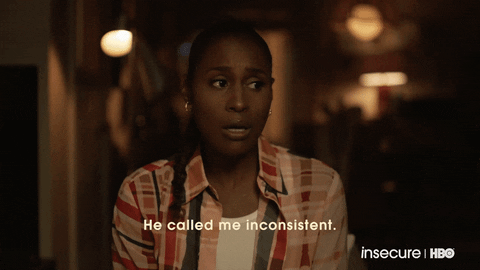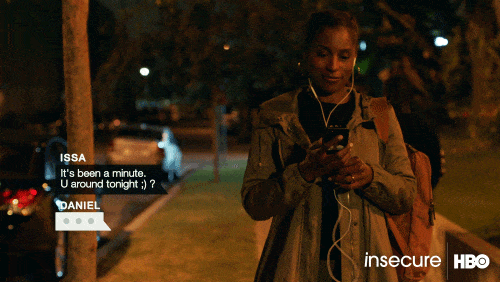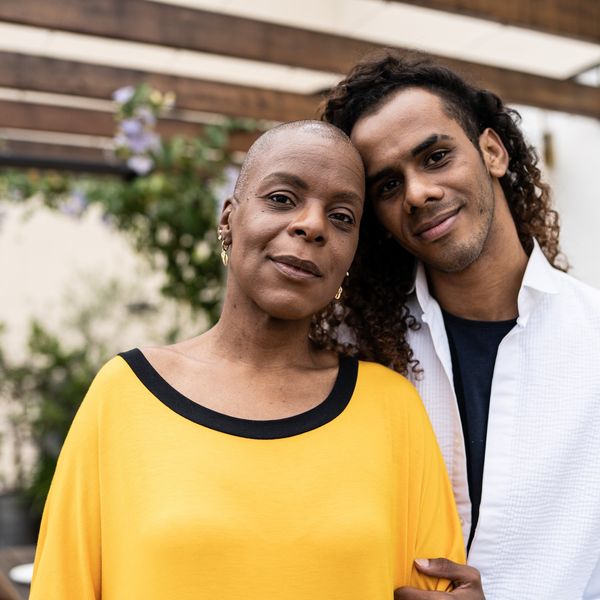It has been almost four years now (y’all, where does the time go?!) since I wrote a piece for the platform entitled, “I Was 'Ghosted' By My Best Friend.” Although I personally don’t do social media, I do check in on different accounts from time to time and I recall some people saying in the comments of one of ours that if a BFF ghosted me, we were never friends, to begin with. Yeeeeeah, I beg to differ because I know parents who have “ghosted” their children, spouses who have “ghosted” their partners, long-term people who have "ghosted” their relationships, and yes, friends — genuine friends — who have “ghosted” their friends.
Telling Signs of a Serial Ghoster
To me, the thing that I think isn’t discussed enough is the kind of people who are serial ghosters (folks who run more from and avoid situations rather than dealing with them head-on). Because when the traits of ghosting are in you, it really doesn’t matter what kind of relational dynamic you are in — more times than not, when it gets to be too much for you (whatever “it” might be), you’re gonna “get ghost” regardless. Therefore, it’s up to the rest of us to know what the signs of ghosting look like, so that we can decide how deep we want to go with these types of individuals.
That said, it is from both my personal experience along with the observation of other individuals and their relationships, that I’ve come up with seven pretty spot-on indicators of a serial ghoster — ones that can spare you a lot of pain or at least shock, should someone like this decide to up and ghost you one day (hey, it happens to the best of us).
1. Vagueness

Just so we’re all on the same page of what I’m talking about here, one definition of ghosting is “the practice of ending a personal relationship with someone by suddenly and without explanation withdrawing from all communication.” And you know what? If someone has done this to you before, I’m willing to bet some pretty good money that, whether it was when you were first getting to know them or towards the end of the relationship, you picked up on signs of them being vague. You’d ask questions that wouldn’t get direct answers. You’d inquire about things that, while they were all for you talking about them, they had little to say.
While in some areas, you felt close to them, in others, the two of you couldn’t be more distant. And if you really think about it, wouldn’t a ghoster being vague about stuff make a lot of sense? Because if you’re not being clear or direct about your feelings, thoughts, or actions, that typically means that there are some walls up. And if that is indeed the case, that makes it easier to up and one day just…vanish.
2. Inconsistency

People who know me know that if there is one thing that I loathe — LOATHE — it’s inconsistency. Shoot, I’d rather you be consistently mean as a bat than sweet as pie on Monday only to drastically switch up on Wednesday. Consistent people can be trusted (even if that means, as Regina King’s character said in A Thin Line Between Love and Hate, “trusting you to be you”) because you know what you’re dealing with and there is something that is super refreshing about that. That said, serial ghosters lack consistency. One day, they are “all in” the relationship, and the next, they are trying to gaslight you into thinking that you are “doing the most.”
What you need to always remember when it comes to this particular point is consistency speaks to character and reliability. If you can’t say, without absolute certainty, that someone is reliable in your eyes, something is “off” and ghosting is definitely a possibility.
3. Selfishness

How selfish people have friends is beyond me, chile. Because, how are you able to maintain anything if the only thing you really think about is yourself? And yet, I bet if you really “sat in it” for a moment, you could think of at least three people in your world — whether it’s personally or professionally — who are selfish like a mug. Case in point — I know a guy who knows how to charm the pants off of just about anyone to the point where, until you really get to know his core, do you even pick up on how selfish he really is? But boy, be in a jam where you need his help and watch him go from kind and funny to a total assh--e if he can’t find a way to rationalize helping you to benefit him (for instance, posting on social media what he did, so that everyone can think he’s a hero).
Those of you who are fans of ghosting may not choose to see it this way (and that’s fine), but I don’t see how ghosting isn’t a selfish act. If you are in a personal relationship with someone and you suddenly remove yourself from the situation, surely you don’t think that the other person is benefitting from that; surely, the only person who you’re actually considering is yourself. And while you might want to rationalize that it’s a form of self-preservation, stating where you stand, setting boundaries, and/or removing yourself from the situation is the far more mature approach. If you don’t believe me, tell me how mature you would think it would be of someone to up and, out of nowhere, ghost you.
4. Non-Committal

The former friend that I referred to at the beginning of this? After doing some shady stuff in her marriage and then telling me during that time that she’s not sure if she’s ever really loved anybody, I really should’ve taken all of that to heart because what she was really saying is she struggles with commitment — and someone who rolls like that? They most definitely have the potential to ghost you. And here’s the thing — anyone can feel the wrath of a commitment-phobe. I mean, just think about it. Commitment-phobes run from deep emotional attachments. Commitment-phobes don’t like making long-term plans. Commitment-phobes never really let you know where you stand with them. Commitment-phobes act like accountability is “suffocating them.” Commitment-phobes are hot one day and cold the next. If just reading this caused you to immediately think of someone in particular, that’s not by happenstance. Your conscience is trying to alert you to the fact that you just may have a serial ghoster in your world. For the sake of your heart, don’t take that lightly.
5. Perfectionist (Kinda)

You might not’ve seen this one coming, but just hear me out. Have you ever paid attention to how people who ghost others talk about the situation? It’s usually something along the lines of, “I don’t have time for that BS. I deserve better.” Yeah, one day, sooner than later, I’m gonna write an article about how deserve is earned, by definition of the word (“to be worthy of, qualified for, or have a claim to reward, punishment, recompense, etc.”) and a lot of people are out here talking about what they “deserve” while thinking that they shouldn’t treat others in the way that they would like to be treated. And you know what? Anyone who says that they would prefer to be ghosted is lying. I don’t care how much a ghoster ghosts other people, it’s usually not until it’s done to them that they realize how utterly disrespectful it can be.
Anyway, let me get on to my point about this trait of serial ghosters — watch out for people who hold others to a bar that they don’t even keep themselves. It’s like, no matter what you do and how hard you try, to them, it’s never good enough; yet somehow, you should accept whatever crumbs or fickleness the ghoster offers you. Yeah, don’t even get me started on how a lot of ghosters are also narcissistic as hell (check out “3 Warning Signs You're In Love With A Narcissist” and “What If It's Your Parents Who Happen To Be The Narcissists?”). For now, I’ll just say that some ghosters will justify ghosting on the grounds of someone not being “good enough” to them when they are actually not all that impressive in the relationship their damn selves. Yeah, people who are ego maniacs or who lack humility typically have no problem with ghosting folks. Watch out for them. That kind of arrogance is dangerous.
6. “Passionately Shallow”

Another trait of a serial ghoster is the fact that they tend to be quite charming. Yet, strangely enough, at the same time, no one can really say that they know them. Not when it comes to anything of any real depth or relevance. A part of that is because, again, oftentimes ghosters have huge ego issues which is why they don’t want to face issues head on — they would rather run than really deal with things because dealing requires revealing.
Also, serial ghosters don’t usually care for anything deep and meaningful. As long as stuff can remain on the surface, that’s comforting for them because shallow doesn’t require very much intimacy. So, while they may be all about making sure that you have a good time, if you are looking for something heartfelt or long-term, they are probably going to disappoint you — more times than not.
7. Reactive Instead of Proactive
 Which One Are You Reaction GIF by Dr. Donna Thomas RodgersGiphy
Which One Are You Reaction GIF by Dr. Donna Thomas RodgersGiphyLast one and this is a biggie. Because of all of the other traits that I just shared about serial ghosters, please hold close the fact that they usually are not very proactive as it relates to maintaining relationships. They aren’t spending a ton of time trying to figure out how to support you, meet your needs or keep the relationship going for the long haul. They would rather disappear and come back and apologize (usually when they want something else or more from you) than show up on the front end of…just about anything. And because they are this way, it means that, with a ghoster, 8.5 times outta 10, you are going to be doing most of the work. And you know what? 9.5 times outta 10, it’s never worth it in the long run.
An author by the name of J.M. Darhower once said, “Worse is loving someone who disappears and never knowing if they’ll come back. Because how do you move on if you’re not even sure they’re gone? The answer is—you don’t. When you spend most of your life chasing ghosts, eventually, you become one.” This is absolutely why I wrote this article — so that you don’t allow the destructiveness of serial ghosters infect you to the point that you become one of them.
There are other more mature and responsible ways to handle relationships, even when it’s time for them to come to an end, than ghosting. If you’re constantly being ghosted, please raise your bar. If you are a serial ghoster, please seek help. There’s nothing admirable about vanishing outta people’s lives and karma tends to handle ghosters with a vengeance. Never say that you weren’t warned.
Let’s make things inbox official! Sign up for the xoNecole newsletter for daily love, wellness, career, and exclusive content delivered straight to your inbox.
Featured image by Giphy



























